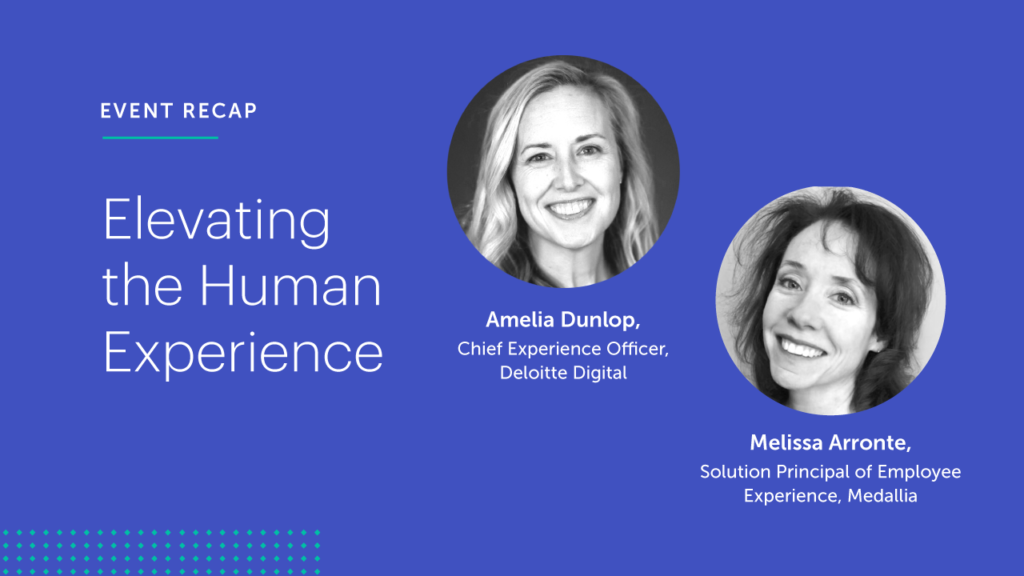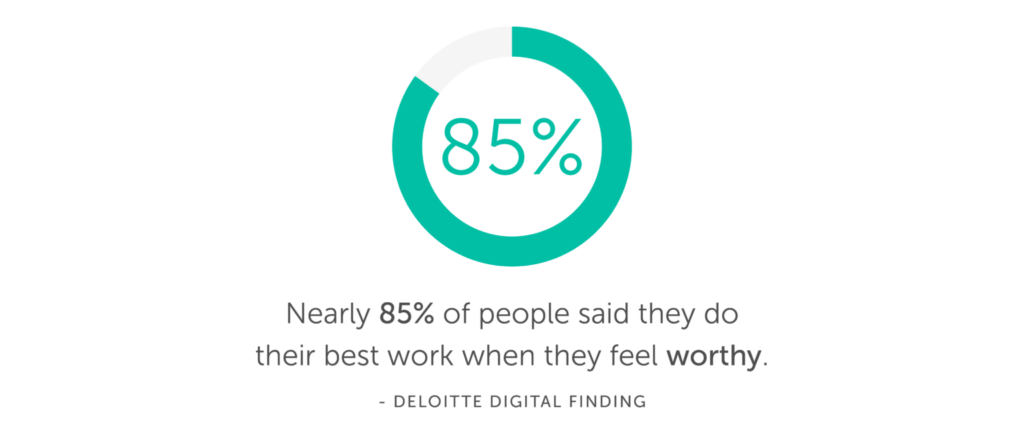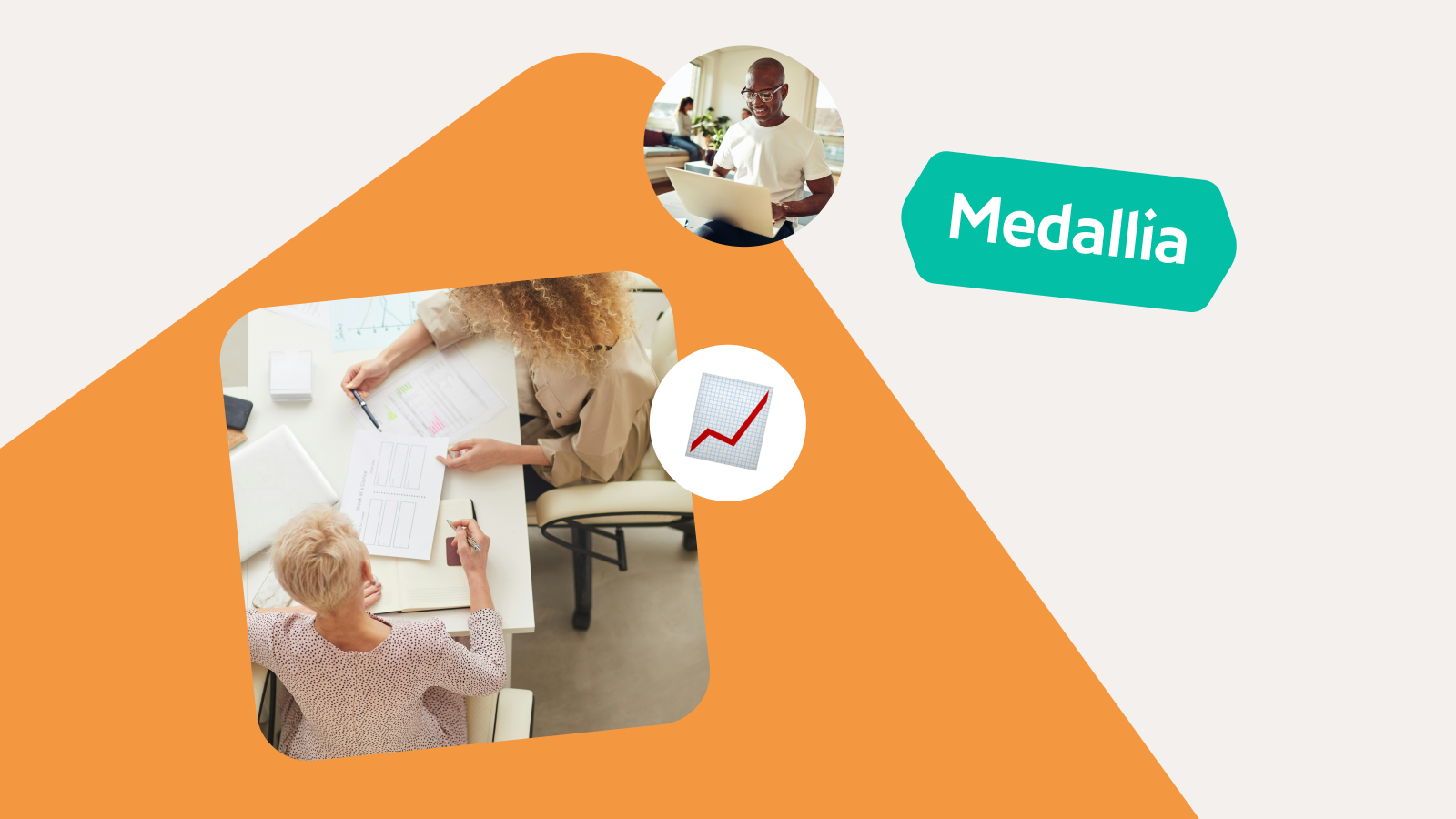The Next Frontier of Employee Experience: Elevating the Human Experience
January 26, 2022
Employee Experience
Having worked with many organizations of all sizes across industries, I’ve witnessed firsthand how a strategic focus on employee experience can transform a company in so many positive ways, and even help employees find love and worth at work — the same concept explored in a new book by Amelia Dunlop, Chief Experience Officer at Deloitte Digital, titled Elevating the Human Experience: Three Paths to Love and Worth at Work.
I recently chatted with Amelia about her new book and how focusing on human experience — the next frontier of employee experience — is opening up a much-needed dialogue on individual worth, vulnerability, and authenticity in the workplace.
Setting the stage
Elevating the Human Experience: Three Paths to Love and Worth at Work is a fascinating and thought-provoking read. It sheds light on the human experience at work and how many of us don’t feel seen as our authentic selves, or fear showing up as our true selves. When you consider how much of our lives are spent at work, helping employees feel worthy and valued is mission-critical.
Research conducted by Deloitte Digital reveals that 9 out of 10 people want to feel worthy, but 5 out of 10 struggle to feel worthy at work. This has direct implications on employee performance and job satisfaction.
Three paths & love at work
Elevating the Human Experience introduces three paths to love and worth in the workplace. These paths — the inward path of the self, recognizing the worth of another, and the community of work — foster the creation of professional experiences that are desired by individuals, their teams, and their clients.
The concept of love at work is thought-provoking, but may be off-putting for some. Some may think, love at work? Those two words don’t belong in the same sentence. Others may say, of course; I’m all in. Interestingly, Amelia defines love at work as the willingness to invest in someone else’s growth. It’s a selfless caring that tells a colleague: I see you; you are worthy; I want to help you feel valued at work; and be your best, true self.
When this occurs, an organization’s human experience is elevated, employees are engaged and empowered, productivity and innovation prevail, and the desired business outcomes are more likely to be achieved.
Why elevating the human experience is important
Deloitte Digital uncovered that 50% of respondents struggle every day to have their voices heard, be kind to themselves, to set boundaries to limit burnout, and to learn what it means to love themselves. And a past survey from the American Psychological Association’s Center for Organizational Excellence found that only about 58% of employees feel valued by their current employer and are satisfied with their employer’s recognition practices.
Many employees also struggle with authenticity. Why is it that people feel they have to be a different version of themselves when they show up at work? Or they ask themselves: Which version of me should I be right now? This can prohibit employees from being their best and doing their best. It also points to the level of trust and acceptance of vulnerability that exists within a company’s internal culture.
When an internal culture lacks the promotion of worth and value, the results can be highly disruptive — productivity lags, complacency sets in, and innovation suffers. When employees exit to pursue new opportunities, the loss has far-reaching ramifications, from knowledge drain to cost; the cost to replace employees can range from 1.5 to 2 times their annual salary. Further, it can fuel a decline in morale among the remaining workforce. It’s a perfect storm that results in a downward spiral of disillusioned employees and lackluster business outcomes.
Worth is the new currency
Elevating the human experience at work by focusing on love and worth is a new concept — one that is in the beginning stages of being explored and discussed. Imagine how an organization can transform itself by empowering its greatest asset — its employees — to feel valued and worthy.
At Medallia, we believe that transformation comes from ensuring that employee voice is at the center of the organization. From encouraging employees to share their ideas to deploying video to create a stronger, personal bond, our continuous understanding tools offer innovative ways to engage with employees. It’s important to empower them (in real time, and during the flow of work) to share how they are feeling, what their challenges are, and ideas they have to improve the business.
This experience-led approach demonstrates to employees that their ideas are valued and respected. And when employees feel the company is actively listening — and most importantly, taking responsive and meaningful action on their behalf — it promotes a culture of worthiness. This is so powerful, because an engaged, empowered workforce can transform a company’s operational efficiencies, product and service innovation, financial performance, and brand reputation.

How to start helping your employees feel worthy & valued
1. Have that all-important first conversation
Reading Amelia’s book is an invitation to take the first big step and have an open, honest, and vulnerable internal dialogue. It will require a reshaping of your organizational mindset, foregoing traditional practices for a new approach.
This can feel overwhelming, and even scary, but the risk of staying complacent is far greater. I often work with clients who are navigating this change management process — experimenting with new approaches to understanding and their improving employee experience, and rethinking programs that may have been in place for years. They need to start by seeing how employees are really doing, what topics are being discussed, and who might be frustrated or struggling.
2. Reevaluate how growth-oriented feedback is shared
People can’t grow their careers without constructive feedback. And there is both an art and science to giving that feedback. Many organizations recently completed their 2021 year-end performance and planning reviews, which is often an exhausting process. Some reviewers don’t know how to offer feedback in the right way, which can leave employees feeling under-appreciated or misunderstood. How many of us can still feel the sting of years-old feedback that could have been shared in a more loving, less careless way? Feedback should elevate our human experience, not diminish it.
Systemic change can only occur after a re-evaluation of how feedback is received and shared during the traditional annual process, and then informally throughout the year. Words can hurt. Growth-oriented feedback is loving feedback, which fosters a positive, productive workplace culture.
3. Build an infrastructure that makes employees feel valued & worthy
One of the best ways to make people feel valued and worthy is to give them a voice. And the global workforce has never been more diverse, so there are many more voices that need to be heard. Our recent research study found that companies with strong employee experience programs will:
- Capture timely data, using a diverse set of direct and indirect sources. They get feedback from their employees frequently and comprehensively.
- Proactively ask employees about rapidly changing, and even personal, topics like health, wellness, personal needs, and life events. They create an environment in which employees feel safe to give honest feedback.
Notably, the organizations that asked for and acted on frontline employee feedback garnered the highest Net Promoter Scores, meaning a very high percentage of these employees were likely to recommend the company as a place to work. And those with a collaborative platform — one that encourages employees to submit their ideas and innovative thoughts — also foster an organizational culture that champions employee worth and value.
We elevate the human experience when we focus on fundamental human worth and do our best to help others grow to be their best versions of themselves.
Amelia Dunlop
Medallia and Deloitte Digital look forward to continuing this exciting, transformative — and very human — dialogue about the next frontier of employee experience. Will you join us?
To learn more, check out Melissa & Amelia’s recent conversation on Elevating the Human Experience.







